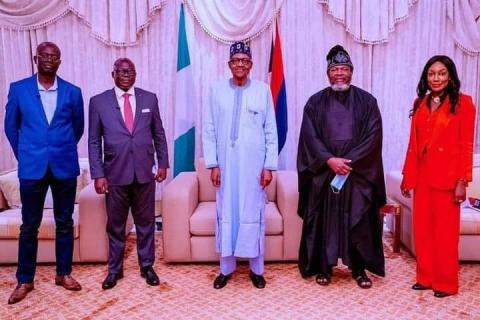
Obviously, the Arise team was perfectly capable of doing more and should have. But then, they might have been held back by the rules and conditions attached by the president's handlers.
It came out of the blues. Nobody expected it, having got used to the president's aversion in recent years, to either talking to Nigerians through a nationwide address, or through a media interactive session. An opportunity came knocking, some months ago, when the National Assembly invited the president over the ongoing insecurity in the land - an invitation the presidency first accepted to honour, and then bizzarely, did a volte-face about forty-eight hours later as the powers of the National Assembly to invite the president now became the issue at stake. Ever since that debacle, public angst against the president's taciturnity in the midst of so much security turmoil has grown to a crescendo. 'The president should talk to us' has been become a public mantra as spiralling violence, kidnappings, and killings in the country continue unabatedly, leading to an American think tank, 'The Council on Foreign Relations,' designating Nigeria as a failed nation.
So, understandably, it was with some measure of intrigue and interest that Nigerians welcomed the announced presidential chat/interview with the ARISE TELEVISION NEWS team of media veterans of the highest quality. Led by the founder and CEO of the organisation, it was an A-team of the news organisation. Their credentials spoke eloquently to their accomplishments over the years. But most importantly, their profile was that of a group of journalists who could not be intimidated - even when the interviewee was the president of the Republic. After all, Nduka Ogbaibena the owner of Arise Television has traversed the various corridors of power at the highest level in the country for years. Both Olusegun Adeniyi and Reuben Abati were once media Czars and straddled the corridors of Aso Rock for four good years on behalf of their principals, both Presidents Shehu Yar'Adua and Goodluck Jonathan as their spokespersons. Tundun, the last of the quartet was not as popular and well known as the others, but had established a somewhat fearsome, intellectual reputation as an anchor in the Arise news outfit on the morning belt.
Of particular interest to Nigerians was the state of mind of the president which had been a major and constant source of speculation and suspicion among the citizens. Most Nigerians were convinced that the president no longer had the mental faculty to function to the full demands of his office due to the general belief that he was suffering from dementia, a degenerative disease that robs a person of his or her memories.

Thus, the presidential interview, in the minds of Nigerians was going to be one big train ride full of fireworks, a royal rumble, and one that will keep Nigerians glued - not because the president is naturally imbued with the right oratorical skills and natural talent to hold people spellbound, but simply because the stakes in Nigeria could not have been higher.
How wrong Nigerians were! To be fair to the Arise crew, they did ask questions of the moment, bordering on insecurity, the Ipob threat and the military operation in the south east, as well as question on the non-appointment of Igbos into his government. The rail line to his paternal home, Maradi, in Niger Republic was also in focus as well as the herders/farmers clash. Of course, the economy had to be part of the mix, and it was.
It was refreshing to see that president Muhammadu was not as bad as previously speculated. He understood the questions quite alright and answered appropriately, though one might quarrel with the content of his answers, especially when he veered off completely in his response to one or two questions. At such moments, the echoes of his speculated dementia must have resurfaced in the minds of those watching.
But what went wrong with the entire interview was the inability of the interviewers to properly hold brief on behalf of Nigerians. Having asked the right questions, and gotten unsatisfactory answere, there was no push back, no follow up questions. The media veterans just sat back, unable to take on the president, to counter the narrative that was obviously not true or lacking in substance. They provided no evidence or data in their engagement with the president, especially on corruption and the economy. The height of their failure was their inability to do a follow up on the president's open grazing comment which is today inconsistent with the generally accepted position on the need to ban open grazing everywhere in the country - a position now accepted by both southern and northern governors. The president's response seemed to be a repudiation of this new, generally accepted solution by the governors and is capable of opening up a new vista of violence. But just like the president's controversial response on the Nigeria - Maradi rail line, the Arise crew failed to remind the president that as at the time hundreds of millions of dollars were approved for the rail line to Niger, thousands of students were at home due to the refusal of government to fund the universities following the ASUU strike..
Obviously, the Arise team was perfectly capable of doing more and should have. But then, they might have been held back by the rules and conditions attached by the president's handlers.